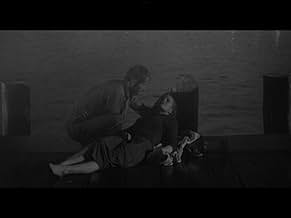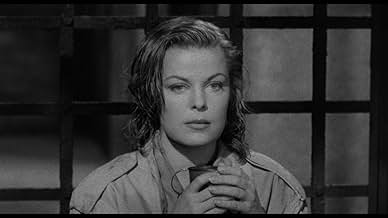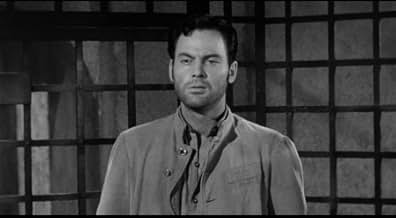Agrega una trama en tu idiomaA condemned murderer, scheduled to hang in the morning, asks for the company of a woman in his final hours.A condemned murderer, scheduled to hang in the morning, asks for the company of a woman in his final hours.A condemned murderer, scheduled to hang in the morning, asks for the company of a woman in his final hours.
- Dirección
- Guionista
- Elenco
- Dirección
- Guionista
- Todo el elenco y el equipo
- Producción, taquilla y más en IMDbPro
Opiniones destacadas
I admit it. I feel a strange fascination (to borrow one of his titles) for the films of Hugo Haas, written, produced and directed by, and starring. I know. They are B movies. He could not command Hollywood's elite. But he had his stock company - Cleo Moore, Beverly Michaels, Jan Englund, Anthony Jochim - just as John Ford had his. His cinematographers, Paul Ivano, Edward Fitzgerald, were craftsmen. His work is idiosyncratic. At its best it is unique and memorable. He was a Jew who escaped the Holocaust while his brother, left behind, disappeared into Auschwitz. He was a man of European sensibility floundering in America. His stories are studies in irony. Some bear the bitter irony of Guy de Maupassant, others the tender twists of O. Henry. He puts his character, a lonely middle-aged man on the downside of life, in the way of his passionate women. He sounds a pervasive note of sadness. The devastating ending of "The Girl on the Bridge" remains for me second only, in its crushing irony, to Vincent Sherman's "The Hard Way." I don't know why, of all the independent filmmakers of the classic era, he gets the least respect.
"Hold Back Tomorrow" is one of the best and certainly the strangest of Hugo Haas' films. Who else would fashion a film almost all of which consists of two people, a man and a woman, talking? They are alone, locked in a death row cell during his last hours on earth. It is a two-person play. The camera just happens to be there. She is weary of a futile and friendless existence. He awaits an unjust fate. They contemplate death. Twenty years earlier Jean Cocteau wrote a one-person play, "The Human Voice," a monologue of despair. One actress, a suicidal woman, talks into a telephone. Francis Poulenc made it into an opera. OK. Hugo Haas was not Cocteau. But he knew the play. In "Hold Back Tomorrow" he wrote a dialogue of despair. Joe has never been able to cry. He cries. Dora has never been able to smile. She smiles. Myself, my eyes are seldom able to drop tears. They were moist.
Neither not-quite-Marilyn-Monroe Cleo Moore nor post-Shirley-Temple John Agar rose to the heights of stardom. Sometimes artists rise to the heights of artistry if they are given the material to inspire it. This material inspired artistry in Cleo Moore and John Agar. Everything, the story, the emotions, must come from them, their actions and reactions. Singers sometimes talk of being naked in the music. That is, they have only bare accompaniment that leaves them exposed. "Hold Back Tomorrow" leaves its actors exposed. They are alone before the camera. Cleo Moore never got the appreciation she deserved. She is heartbreaking when she delivers, at his request, in sadness a wan smile. John Agar makes us feel his emotional release, his catharsis, when he finally weeps after having vowed fiercely that he would never cry. In the end, Dora and Clara pray for a miracle. Hold back tomorrow is the title and the song. It is also the prayer: the hangman's rope will break; Joe will live. It won't break. We know. But maybe God will grant Joe the mercy of an illusion. Will he, in his last instant of consciousness, feel it break,dream that it has broken, and he has returned to Dora? He has already imagined it. He tells her. He has imagined the breaking of the rope. Hugo Haas hints at another ironic storyteller, Ambrose Bierce, and a cruelly ironic tale, "An Occurrence at Owl Creek Bridge." Bierce's hero feels the rope break, though it doesn't. He dreams, in a last instant, that he is free. Joe enters the death chamber. The clock chimes. The dream could be another movie. If I am guilty of overthinking and overpraising a Hollywood B picture, so be it.
Hugo Haas and Cleo Moore, who played in seven of his films, came, I am sure, to form a bond - she a struggling actress from Louisiana who never made it to the A list, he a major artist in his native country now relegated to petty parts in forgettable movies. They shared a complicity born of sympathy and frustration. In "The Other Woman," their fifth collaboration, Haas played what he was, a luckless actor turned director, Cleo a struggling actress under his direction. He wrote these lines of himself: "He was a big star in Europe. Here he played bit parts, just nothing." He wrote these lines for her: "I've got more talent than all those overpublicized dames ... What did you expect, to pay my way back to Louisiana and give me five bucks for expenses?" In "Hit and Run," her last film for him, her last film for anyone, she addresses her last line to his character: "Goodbye, Gus."
"Hold Back Tomorrow" is one of the best and certainly the strangest of Hugo Haas' films. Who else would fashion a film almost all of which consists of two people, a man and a woman, talking? They are alone, locked in a death row cell during his last hours on earth. It is a two-person play. The camera just happens to be there. She is weary of a futile and friendless existence. He awaits an unjust fate. They contemplate death. Twenty years earlier Jean Cocteau wrote a one-person play, "The Human Voice," a monologue of despair. One actress, a suicidal woman, talks into a telephone. Francis Poulenc made it into an opera. OK. Hugo Haas was not Cocteau. But he knew the play. In "Hold Back Tomorrow" he wrote a dialogue of despair. Joe has never been able to cry. He cries. Dora has never been able to smile. She smiles. Myself, my eyes are seldom able to drop tears. They were moist.
Neither not-quite-Marilyn-Monroe Cleo Moore nor post-Shirley-Temple John Agar rose to the heights of stardom. Sometimes artists rise to the heights of artistry if they are given the material to inspire it. This material inspired artistry in Cleo Moore and John Agar. Everything, the story, the emotions, must come from them, their actions and reactions. Singers sometimes talk of being naked in the music. That is, they have only bare accompaniment that leaves them exposed. "Hold Back Tomorrow" leaves its actors exposed. They are alone before the camera. Cleo Moore never got the appreciation she deserved. She is heartbreaking when she delivers, at his request, in sadness a wan smile. John Agar makes us feel his emotional release, his catharsis, when he finally weeps after having vowed fiercely that he would never cry. In the end, Dora and Clara pray for a miracle. Hold back tomorrow is the title and the song. It is also the prayer: the hangman's rope will break; Joe will live. It won't break. We know. But maybe God will grant Joe the mercy of an illusion. Will he, in his last instant of consciousness, feel it break,dream that it has broken, and he has returned to Dora? He has already imagined it. He tells her. He has imagined the breaking of the rope. Hugo Haas hints at another ironic storyteller, Ambrose Bierce, and a cruelly ironic tale, "An Occurrence at Owl Creek Bridge." Bierce's hero feels the rope break, though it doesn't. He dreams, in a last instant, that he is free. Joe enters the death chamber. The clock chimes. The dream could be another movie. If I am guilty of overthinking and overpraising a Hollywood B picture, so be it.
Hugo Haas and Cleo Moore, who played in seven of his films, came, I am sure, to form a bond - she a struggling actress from Louisiana who never made it to the A list, he a major artist in his native country now relegated to petty parts in forgettable movies. They shared a complicity born of sympathy and frustration. In "The Other Woman," their fifth collaboration, Haas played what he was, a luckless actor turned director, Cleo a struggling actress under his direction. He wrote these lines of himself: "He was a big star in Europe. Here he played bit parts, just nothing." He wrote these lines for her: "I've got more talent than all those overpublicized dames ... What did you expect, to pay my way back to Louisiana and give me five bucks for expenses?" In "Hit and Run," her last film for him, her last film for anyone, she addresses her last line to his character: "Goodbye, Gus."
First, this is not a film noir, nothing to do with crime, but a noir drama, yes, of course, how could it be otherwise? Director Hugo Haas is a film maker whose filmography should be discovered again. After a brief European career, before he escapes from Nazis, he went to the USA and began a second part. And he never made something different from drama. All those films are rather gloomy, desperate, forget any happy ending - as far as I know. All those films involve women - more or less fatale chicks - and engrossing plots, gripping, for not too long films. His films are nearly all alike but who cares? I definitely like his films.
This is my favourite performance from the otherwise rather sterile John Agar. He is "Joe", on death row having been found guilty of strangling three women. He's decided to go out in Garbo style, wanting to be alone and angrily resisting any attempts from his family, or the priest, to comfort him as the big day nears. With twenty-four hours to go, though, he decides that the "company" of a lady might help ease his burden and obliged to help him out, the prison manage to recruit "Dora" (Cleo Moore). Now she's not in a very good place either - indeed had earlier tried to jump in the river; so a few dollars for a quickie with "Joe" didn't seem such a bad offer. Whilst there is certainly a predictability about the latter portion of this drama, it's still performed well and is tautly directed by Hugo Haas. Moore delivers an impassioned effort, indeed in many ways her character is far more intriguing than the sorry-for-himself "Joe". It is a bit dialogue-heavy, but for the most part that dialogue is worth listening to as we head towards the expected denouement - expected on just about every level. It does sail perilously close to melodrama at times, but it has a compensating grittiness and realism that I felt made this a much better than average tale to tell. You probably won't remember it for long afterwards, but it's enthralling enough when you watch.
This is a very original film on a very original story with very original actors, and even the music is original. Hugo Haas was something of a buccaneer in Hollywood, doing his own films, writing his own scripts, finding his own actors and team work, and the result is something of the most original and fascinating of film making during the great age of noirs. Here the film begins with a girl trying to drown herself by jumping into the river, she is rescued against her will and has to return to her more than dreary existence of nothingness, being threatened by being thrown out of her shabby room, having no place to go and no one to care about. By chance two policemen look her up with the strangest of offers: she will be paid $200 for keeping company with a prisoner sentenced to death during his last night, since that is his last wish. She doesn't care about anything and therefore accepts, and most of the film is just the two of them talking together in his cell, airing their mutual hopelessness and finding each other. That's the whole story. The dialog is amazing, extremely intriguing and well written, and the warden, the watchmen, his stepsister also play some part, but as a chamber play this is perfect and enduring. She will never forget her last night with a man sentenced to hang, and no audience could possibly ever forget this film.
A death row inmate has one last wish before he is hanged: to spend the night with a woman. The police bring him a suicidal prostitute. After their night, the two decide they are in love and are married by the prison priest. How will this turn out for the prisoner?
Hugo Haas is a unique filmmaker; his films never really fit into the category of Hollywood productions that follow rules like a happy ending or feature women who are always moral angels without flaws. The latter, in particular, is, in my opinion, a major reason why he never achieved A-list status in Hollywood.
Undeservedly so, in my opinion, because his films are always full of feeling-sentimental perhaps, but that makes his films human, with a different, refreshing view of society.
The acting by Moore and Agar is very solid, and the story is compelling.
Perhaps one of Haas's best films.
Hugo Haas is a unique filmmaker; his films never really fit into the category of Hollywood productions that follow rules like a happy ending or feature women who are always moral angels without flaws. The latter, in particular, is, in my opinion, a major reason why he never achieved A-list status in Hollywood.
Undeservedly so, in my opinion, because his films are always full of feeling-sentimental perhaps, but that makes his films human, with a different, refreshing view of society.
The acting by Moore and Agar is very solid, and the story is compelling.
Perhaps one of Haas's best films.
¿Sabías que…?
- TriviaHugo Haas - who wrote, produced, directed and acted in most of his movies - doesn't appear in this film.
- ConexionesReferenced in The Ultimate Degenerate (1969)
- Bandas sonorasHold Back Tomorrow
Music by Franz Steininger
Lyrics by Johnny Rotella
Arranged and Conducted by Les Baxter
Selecciones populares
Inicia sesión para calificar y agrega a la lista de videos para obtener recomendaciones personalizadas
- How long is Hold Back Tomorrow?Con tecnología de Alexa
Detalles
- Tiempo de ejecución
- 1h 15min(75 min)
- Color
- Relación de aspecto
- 1.37 : 1
Contribuir a esta página
Sugiere una edición o agrega el contenido que falta

















